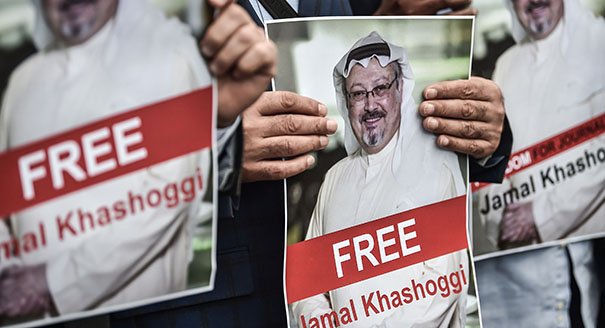Considerable uncertainty continues to surround the disappearance of Jamal Khashoggi at the Saudi Consulate in Istanbul. Khashoggi, who twice contributed answers to Diwan’s Inquiring Minds feature, was a prominent Saudi journalist who had moved to the United States in 2017 after facing mounting pressure for his criticism of the Saudi leadership, in particular Crown Prince Mohammed bin Salman. To get insights into his fate, on October 9 Diwan interviewed Adam Coogle, a Middle East researcher at Human Rights Watch. Coogle has extensively investigated human rights abuses in the region. He received an M.A. in Arab studies from Georgetown University in 2009, and completed a fifteen-month residency in Damascus, where he studied Arabic and worked with Iraqi refugees for the United Nations High Commissioner for Refugees. He was a Fulbright fellow in Jordan in 2005 and 2006.
Michael Young: Do you believe that Jamal Khashoggi was killed at the Saudi Consulate in Istanbul?
Adam Coogle: We cannot say for sure what happened to Jamal Khashoggi after he entered the Saudi Consulate in Istanbul on October 2, but all the evidence right now points to a terrible outcome. It’s unclear what to make of the various Turkish intelligence leaks and Saudi denials surrounding his disappearance, but the simple, confirmed fact of this case is that he entered the consulate and never came out. His fiancée waited for him outside for twelve hours. We hope that the Turkish government will make public all the details and results of its ongoing investigation so we can develop a clearer picture of what happened to Jamal.
MY: Who was responsible, do you think? And if there was Saudi involvement, as has been suggested, how frequent has such behavior been from a Saudi regime that has generally shied away from killing its opponents in so brazen a way?
AC: If it’s true that Saudi agents detained or murdered Jamal Khashoggi, as some Turkish officials have claimed, it represents a striking new low for Mohammed bin Salman’s lack of respect for human rights and the basic rule of law. Crown Prince Mohammed has already demonstrated his impulsiveness and lawlessness through his treatment of human rights activists and political dissidents, as well as his disastrous war in Yemen and his policy to isolate Qatar.
Under Crown Prince Mohammed, the Saudi authorities have also targeted human rights activists abroad physically and through cyberattacks. They even abducted a Saudi women’s rights activist in the United Arab Emirates last March. However, the killing of a prominent journalist abroad—if true—would represent a terrifying new development.
MY: What is it about Khashoggi that so enraged the Saudi regime?
AC: Jamal Khashoggi spoke with credibility on Saudi affairs, because until the last year he was never really a political dissident. Rather, he was akin to an institutional reformist who supported liberalizing reforms from within. He even worked for the Saudi Foreign Ministry in years past and was close to members of the royal family. The fact that someone like Jamal, who knows nearly every Western journalist and analyst who has worked on Saudi Arabia over the last 20 years, went into exile and began publicly criticizing Mohammed bin Salman was apparently more than the Saudi authorities could bear.
MY: What do you anticipate will be the medium- and long-term repercussions of Khashoggi’s disappearance?
AC: As Human Rights Watch, we certainly hope that one of the positive outcomes of this horrendous situation will be that the international media and political establishments of Saudi Arabia’s Western allies will begin to see Crown Prince Mohammed in a different light—not as a young reformist but rather as a lawless autocrat bent on consolidating his rule and stamping out possible dissent in all forms. Even apart from the Khashoggi case, given Mohammed bin Salman’s mass arrests at home and disastrous foreign policies, all countries should stop selling weapons to Saudi Arabia and stop supporting the Saudi-led coalition in Yemen. In addition, journalists and analysts should show the truth of Prince Mohammed’s lawlessness and lack of respect for basic rights rather than fawn over him as a reformer who aims to save Saudi society.






